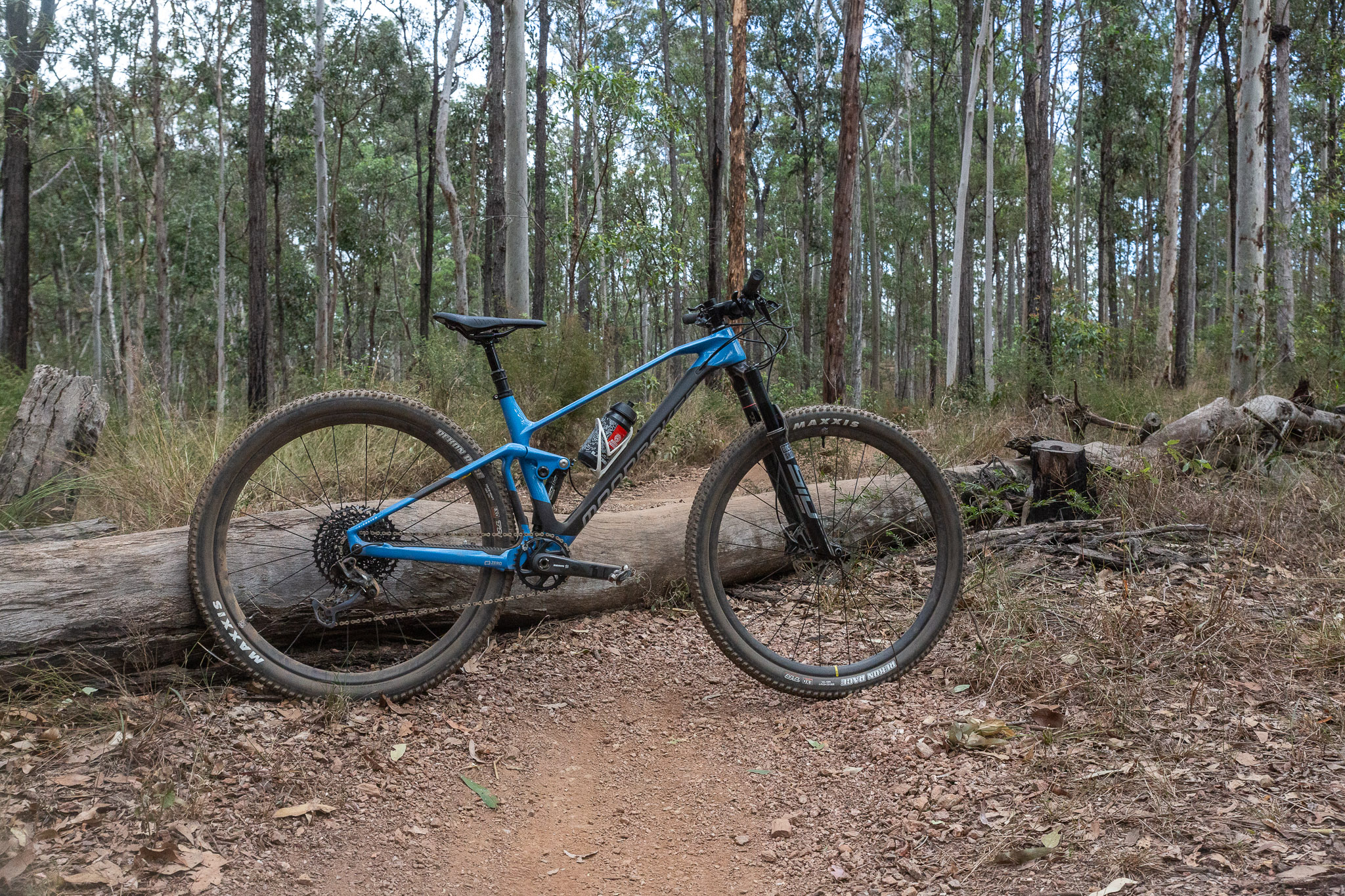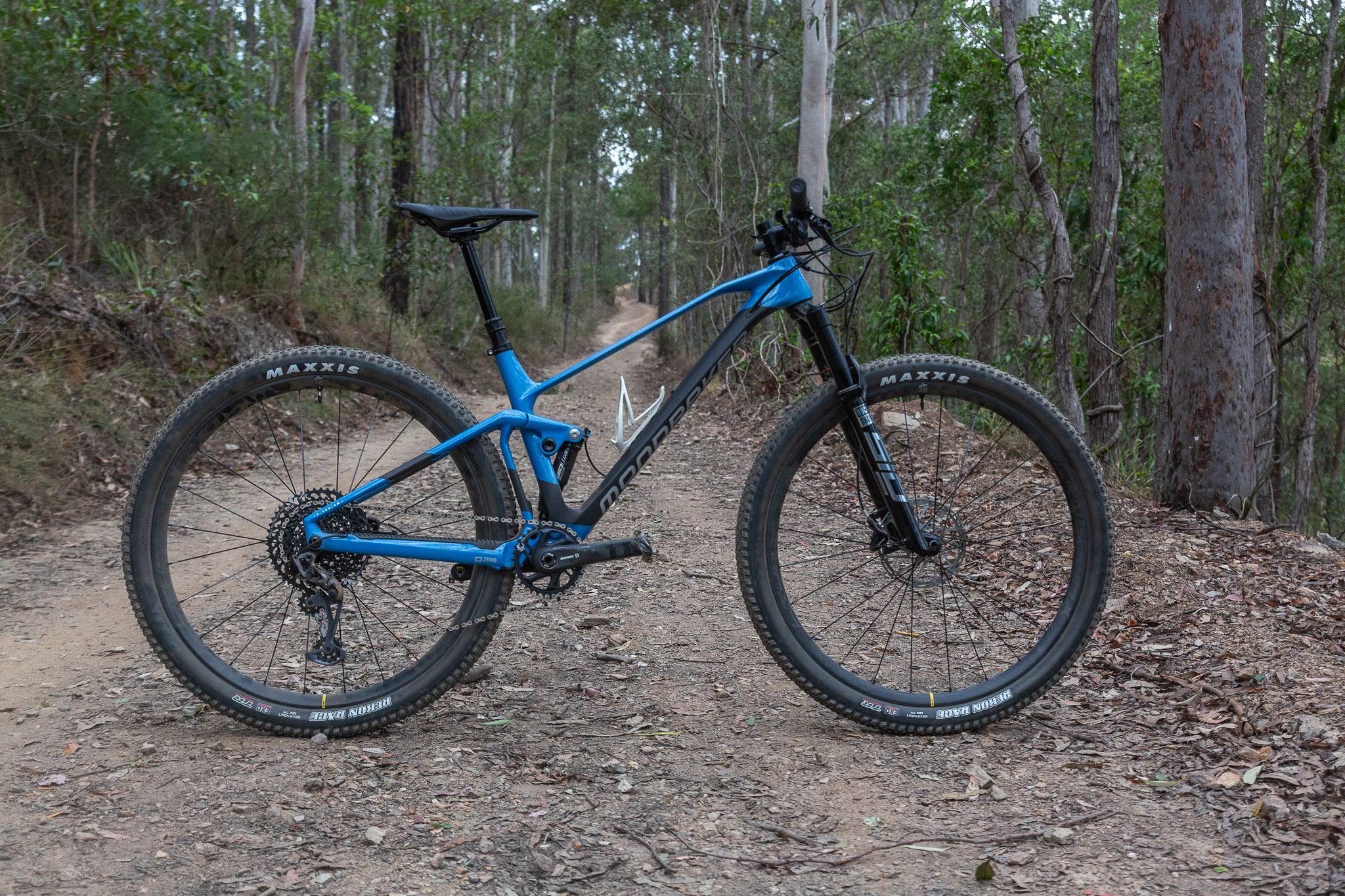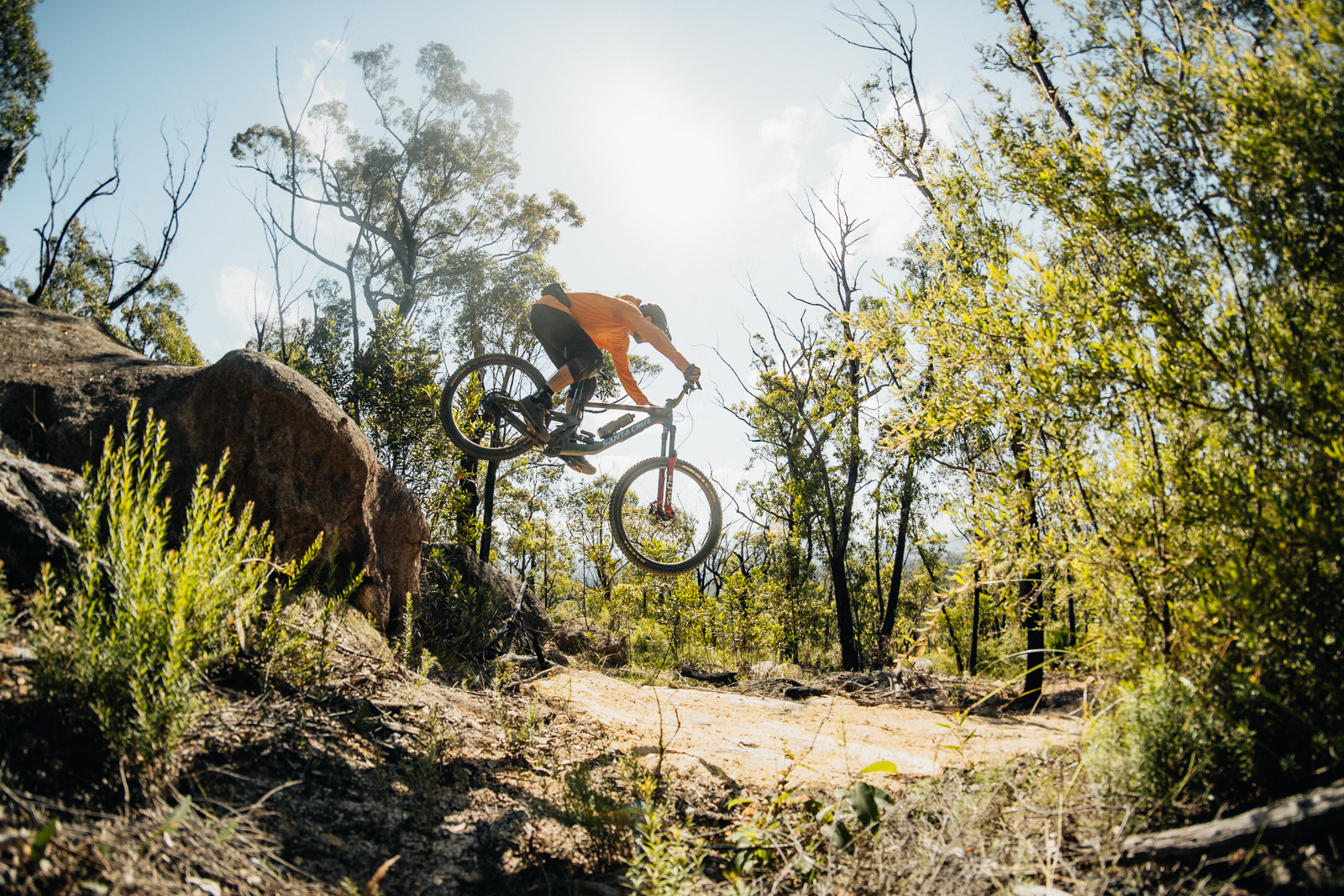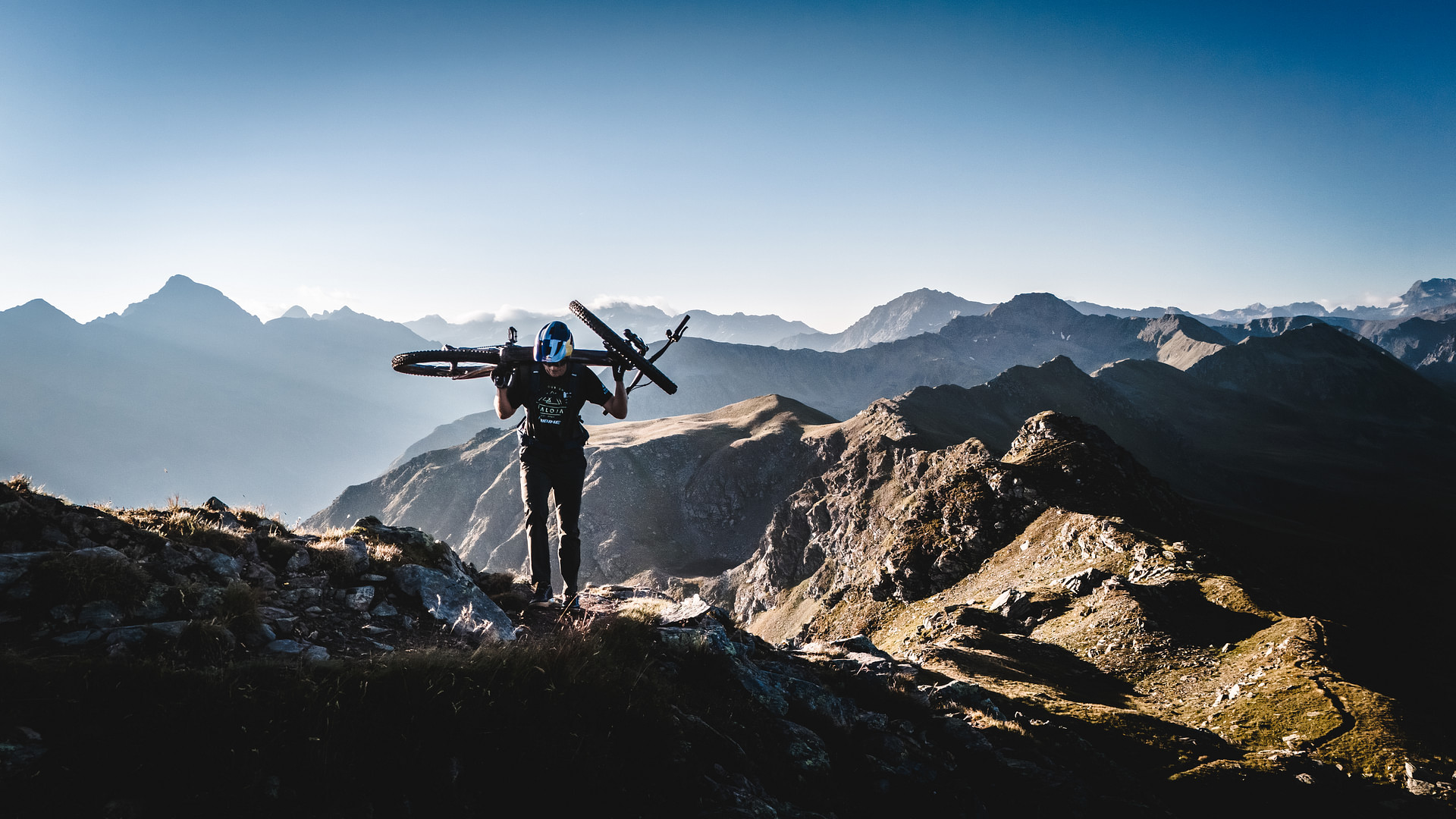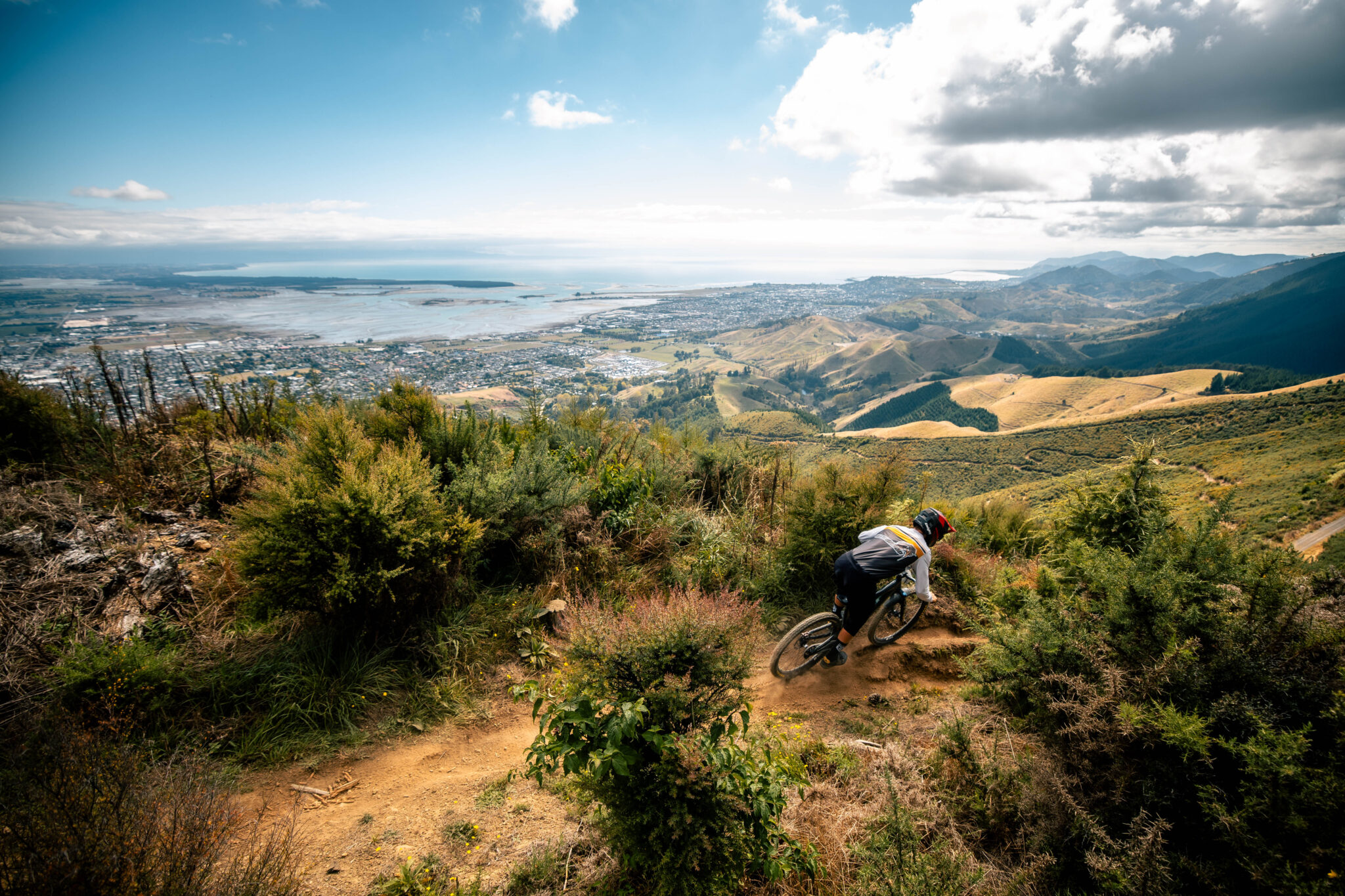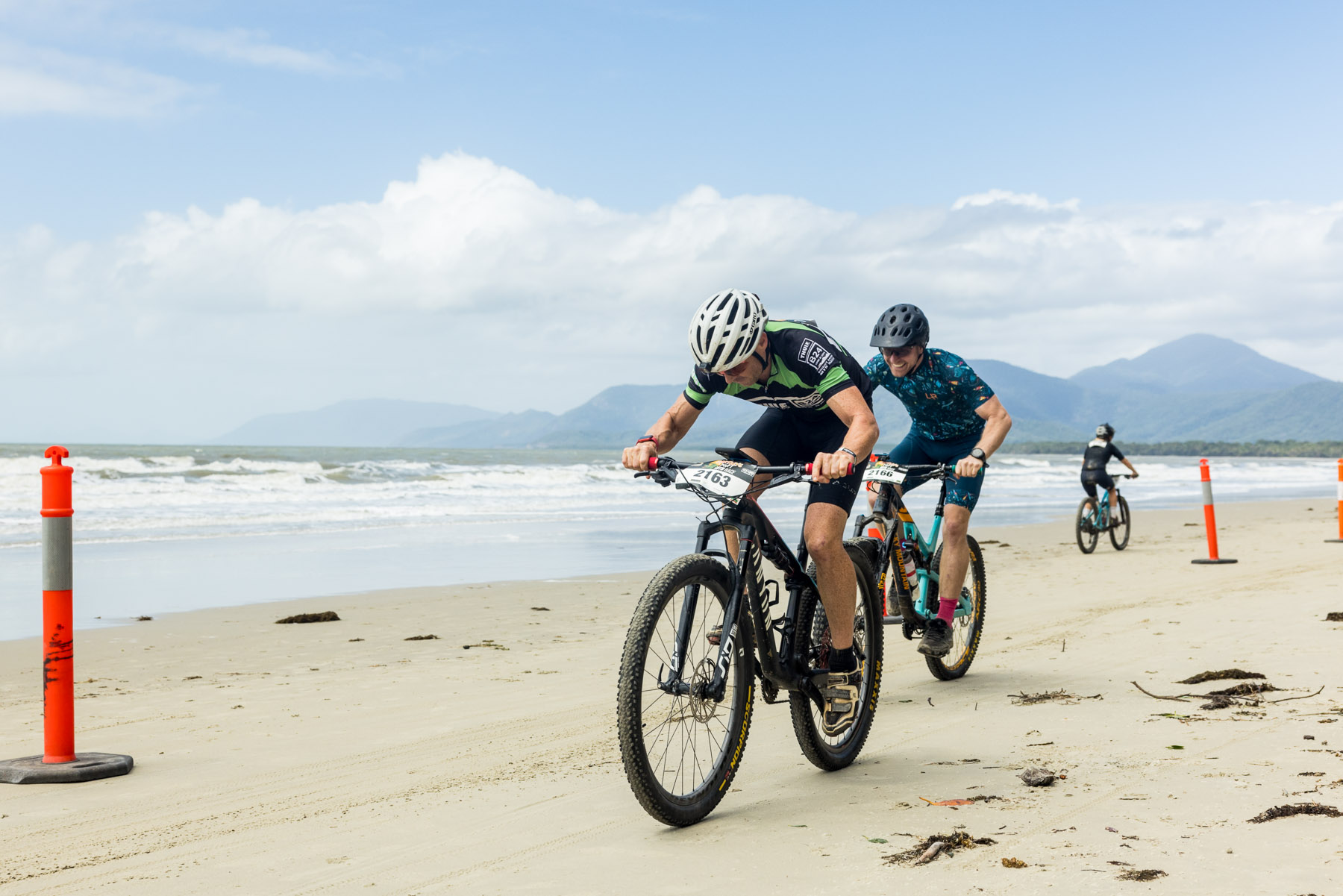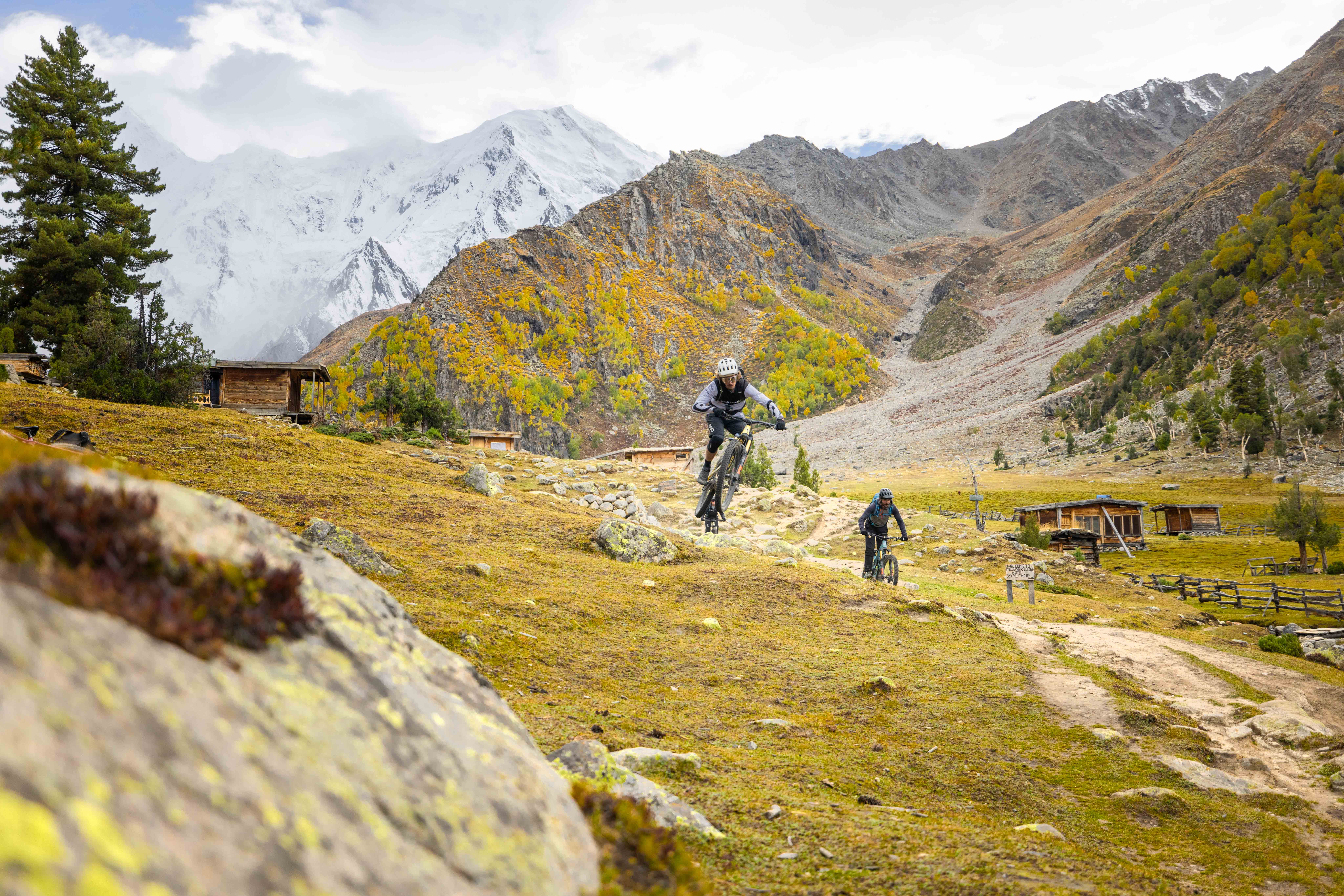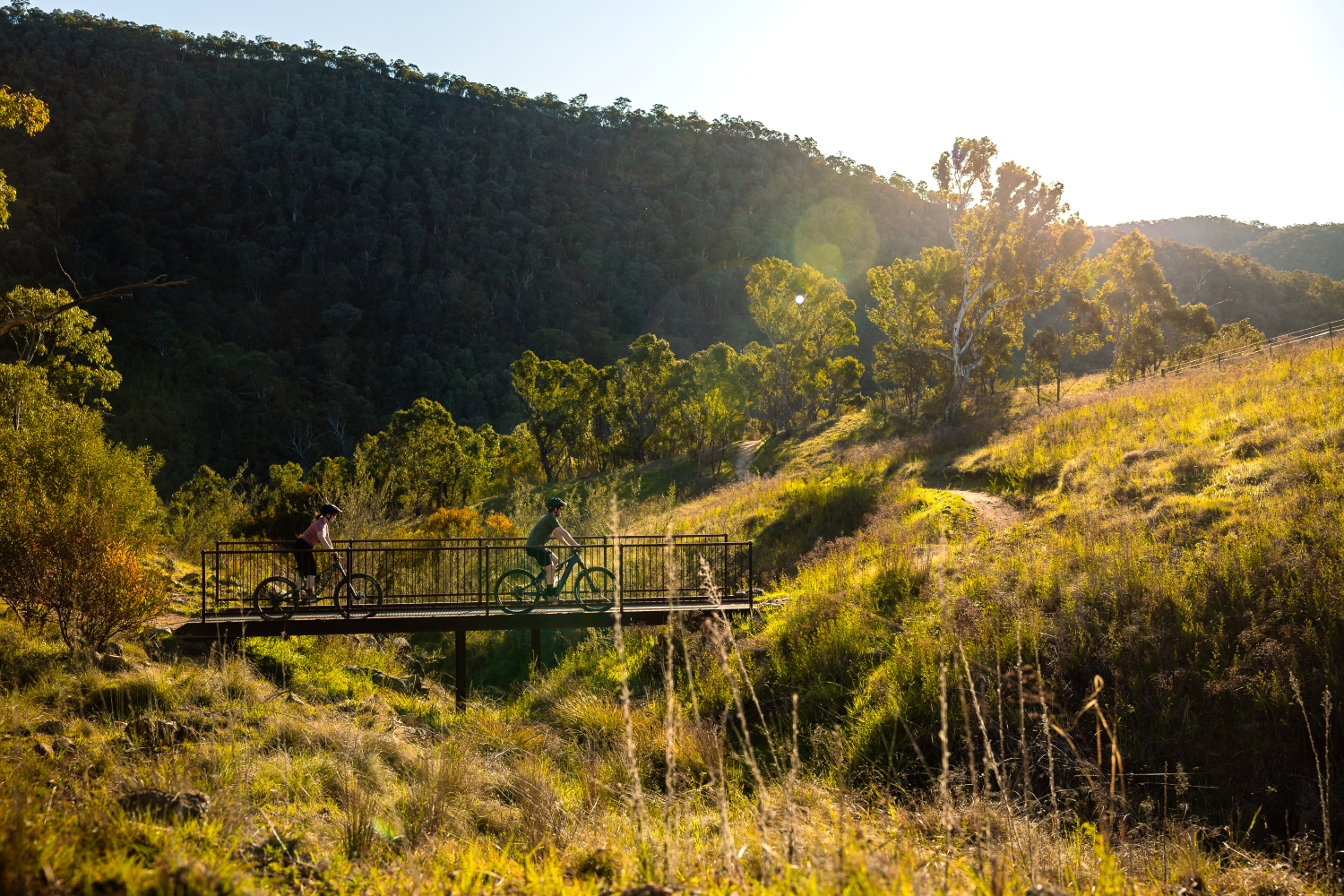TESTED: Mondraker F Podium DC-R mountain bike
The Mondraker F Podium DC-R has won accolades (and World Cups) under Bec Henderson - but how does it handle in downcountry mode?
Mondraker are a Spanish brand who have been heavyweights in the gravity and downhill scene since their inception in 2001. From their first bike—the Petrol DH—to the well-known Foxy enduro model, the brand's pedigree is focussed on being fast downhill. Fast forward to 2019, and the Mondraker F-Podium Carbon RR took its first World Cup Cross-Country podium with a second place in Nové Město piloted by our very own Rebecca Henderson. Several years on, the F-Podium has taken several world championship medals, and multiple back to back World Cup wins: Mondraker have made the leap from gravity to endurance and to say it’s going well is to put it mildly.
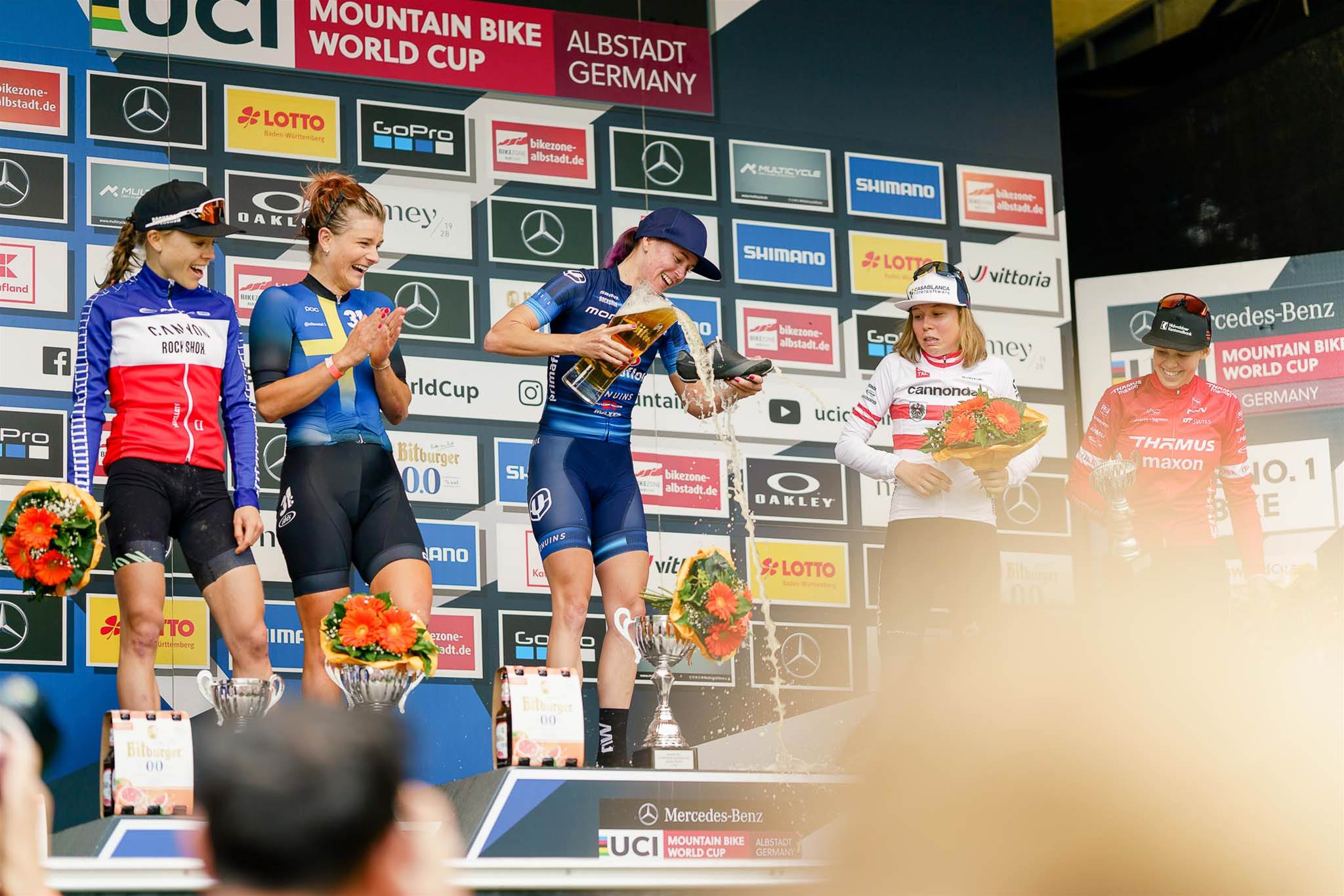
READ: Bec Henderson on happiness and success.
Despite these impressive palmares, Mondraker is still a brand that hasn’t quite reached mainstream popularity in Australia. Perhaps that could all soon change with the introduction of models like the Mondraker F-Podium R DC. Sharing a frame with the World Cup-winnning F-Podium R, the DC (or ‘downcountry’) model features 115mm rear travel and is beefed up with a 120mm fork, compared with the 100/110mm set up of the F-Podium R. This move to longer travel has has been mirrored in many XC race bikes, proving that as courses become more demanding, bikes are specced to reflect the changing nature of gnarly XC terrain.
Coming from a strong background in XC, whenever I get an XC bike to test I wonder which of two options it will be: 1. an enjoyable departure from my own well-specced, lightweight race bike and an easy choice to ride in order to get adequate time on it or 2. A little bit of a punish that isn’t that enjoyable, and you have to schedule rides in order to fairly review. Well, I can say early on that the F Podium Carbon DC R was very much the former.
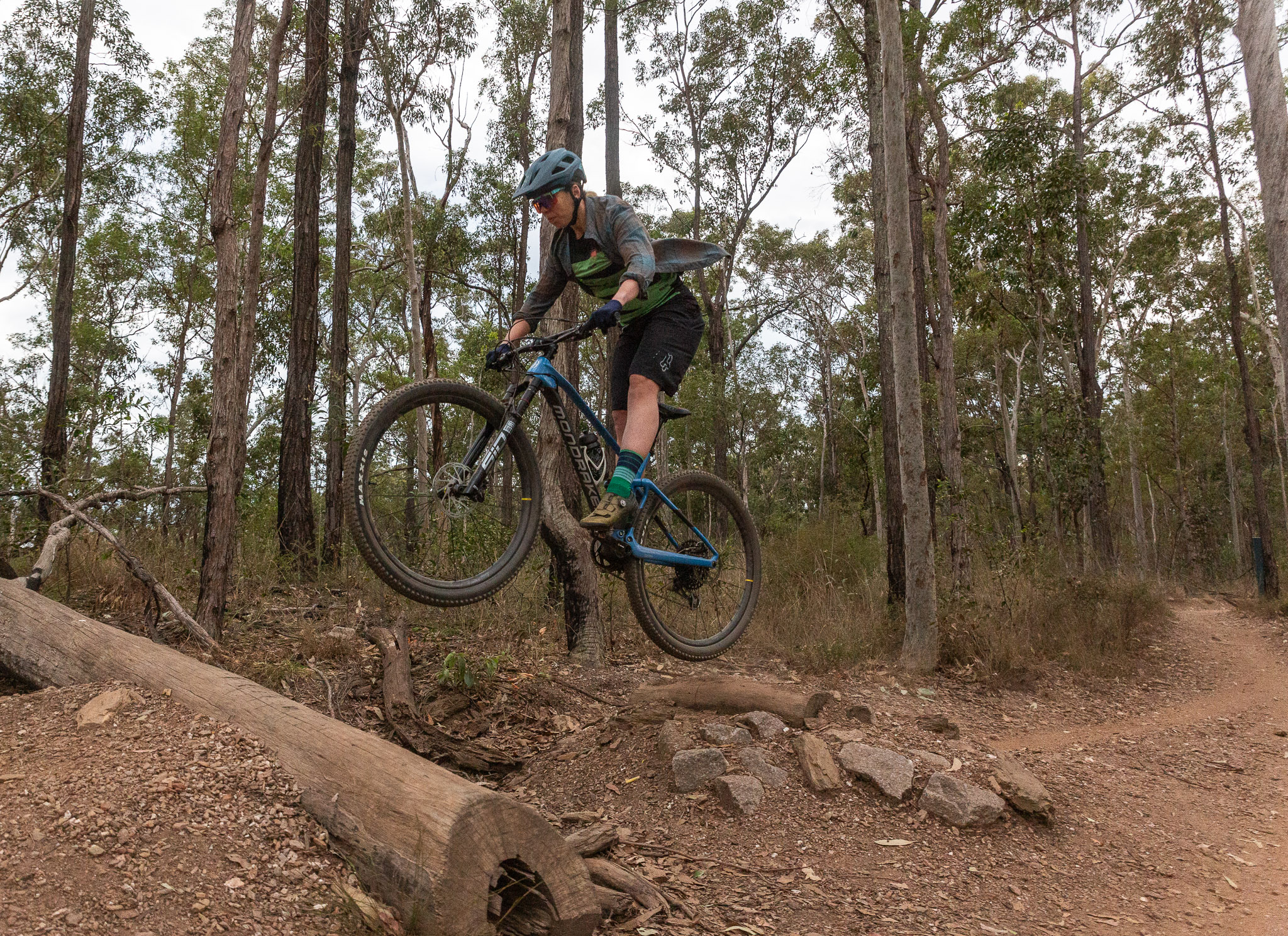
Photographer: Mike Blewitt
Tester: Anna Beck
Riding Experience: Riding and racing bikes for too long, but still enjoys riding cross-eyed uphills
Generally Rides: Orbea Oiz, Yeti SB140, Cervelo Aspero
Height: 168cm
Weight: 64g
Bike Test Track: Bunyaville, Mt Nebo, Ironbark
Initial Impressions
Bicycle manufacturers almost made a meme of themselves with the advent of ‘longer, lower, slacker’ geometry a few years ago. While it was a change in geometry we had to have (does anyone remember 71-degree head tube angles?), it’s become a bit of the ‘laterally stiff, vertically compliant’ marketing jargon we heard throughout the 2000s. Aesthetically, it’s immediately obvious that the F-Podium DC R is different from other bikes: it’s long, sloping top tube gives the impression of even more length, while it’s all business in the rear with the Zero Suspension system. In a gloss blue/matte black combination, this bike is all business.
For Mondraker, longer and lower has been revolutionary in bike geometry allowing for increased stability and better handling. Described as their Forward Geometry, Mondraker states their geometry “improves safety and confidence when descending at speed combined with sharper, more direct handling and better tracking”. In a medium, this translates to a long 450mm reach/603mm top tube, steep seat tube angle of 70.8 degree (effective 75.1), 582mm stack and a universal chain stay length of 432mm. In addition to this, the bike features a reasonably slack headtube angle of 66.8 degrees, paired with a 44mm fork offset. On paper, it could be read that the F-Podium tended to be long and raked out compared to other offerings in the XC market, although many newer releases have some similar geometry numbers.
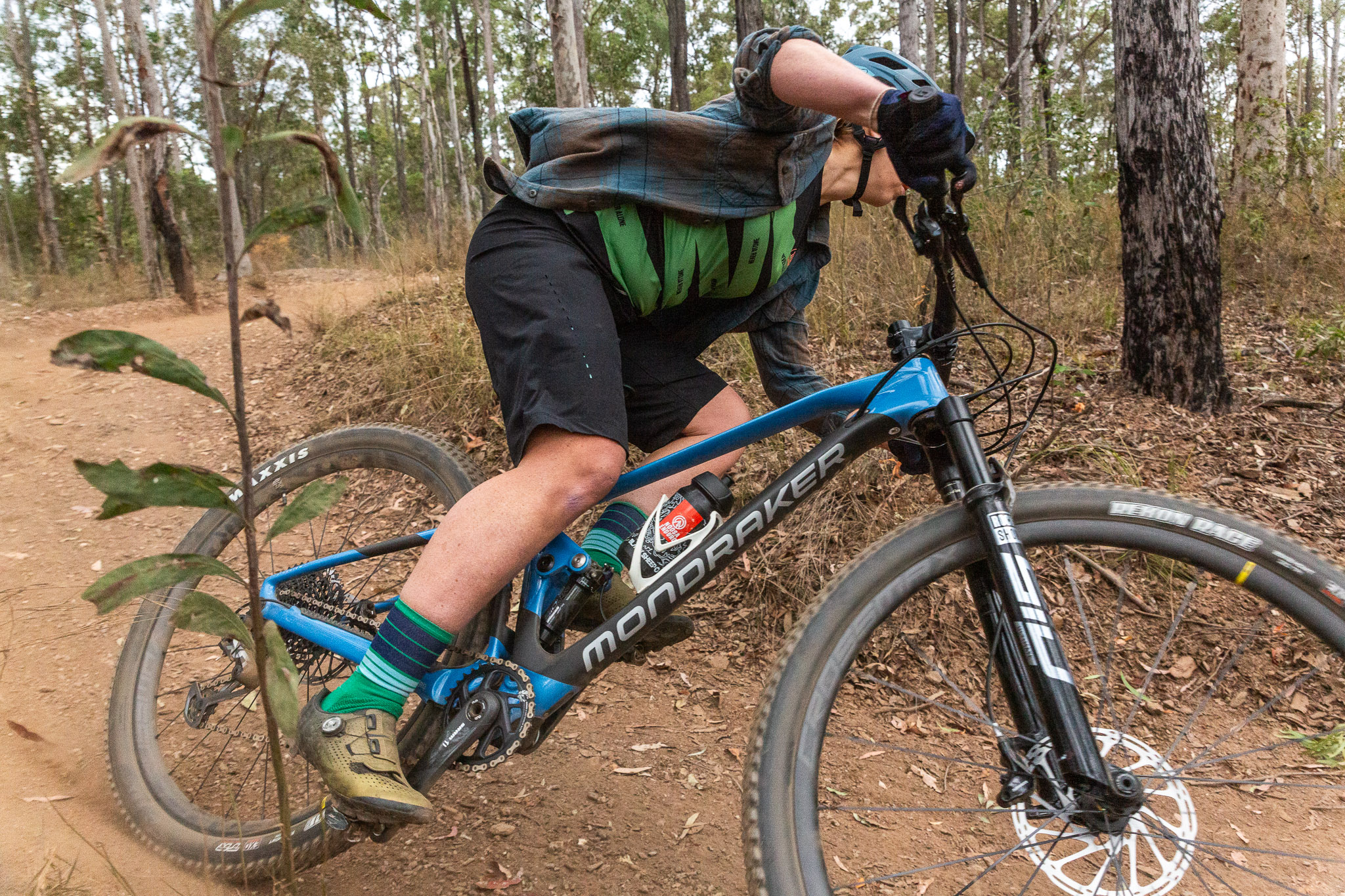
Mondraker’s additional key feature of their range is their Zero Suspension system. Touting zero power loss and exceptional pedalling efficiency, the suspension is designed in a way that it is unaffected by braking forces (ie: no diving suspension under braking load), and also features an efficient platform when pedalling and zero chain length distortion throughout the stroke. The suspension linkage itself is quite formidable: a departure from the swathe of manufacturers relying on flex in bikes such as the Santa Cruz Blur, Cervelo ZFS-5, Factor Lando XC, Cannondale Scalpel and Merida NinetySix, Mondraker have embraced the linkage, and with good effect on pedalling.
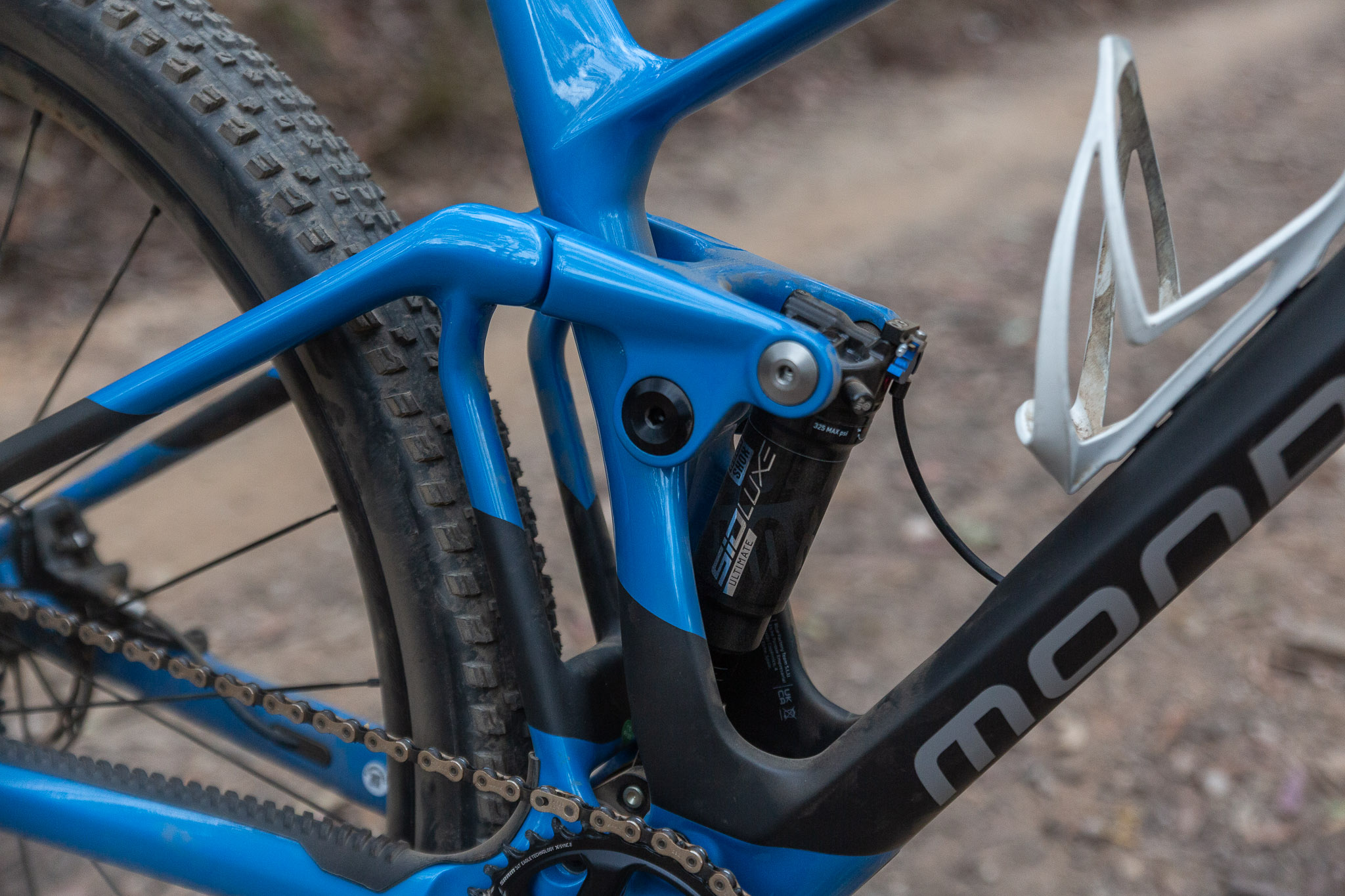
The F-Podium DC R as tested represents what a higher end brand could offer for this price tag: A 120mm RockShox SID Ultimate fork and SID Luxe Ultimate RLR rear shock represent lightweight and race-ready suspension. A mixture of SRAM X1, XO and GX componentry are reliable performers; however it’s perplexing that Mondraker specced such an array of SRAM group sets on the one bike. For example, a GX shifter, XO1 Eagle derailleur, and Level TL brakes.
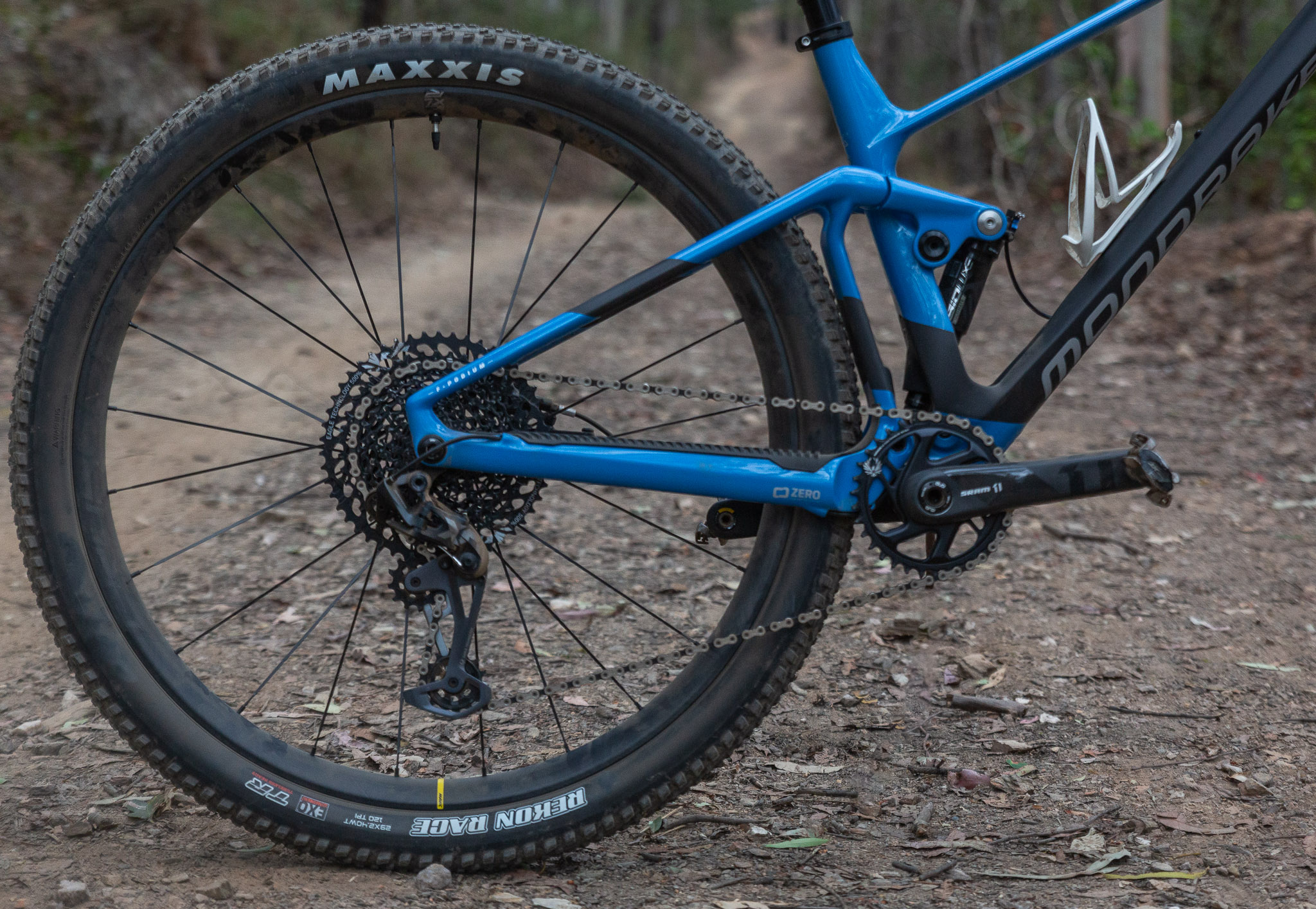
Being a European bike manufacturer, I was intrigued to see the Mavic CrossMax Carbon XL R make a return as an OEM spec. From their early 2000s days of Crossmax SLRs, Mavic have been quiet on the mountain bike scene, at least in Australia, and I was interested to see how the wheel set—reportedly weighing in at a feathery 1600g and with a 30mm internal width—could perform on the trail.
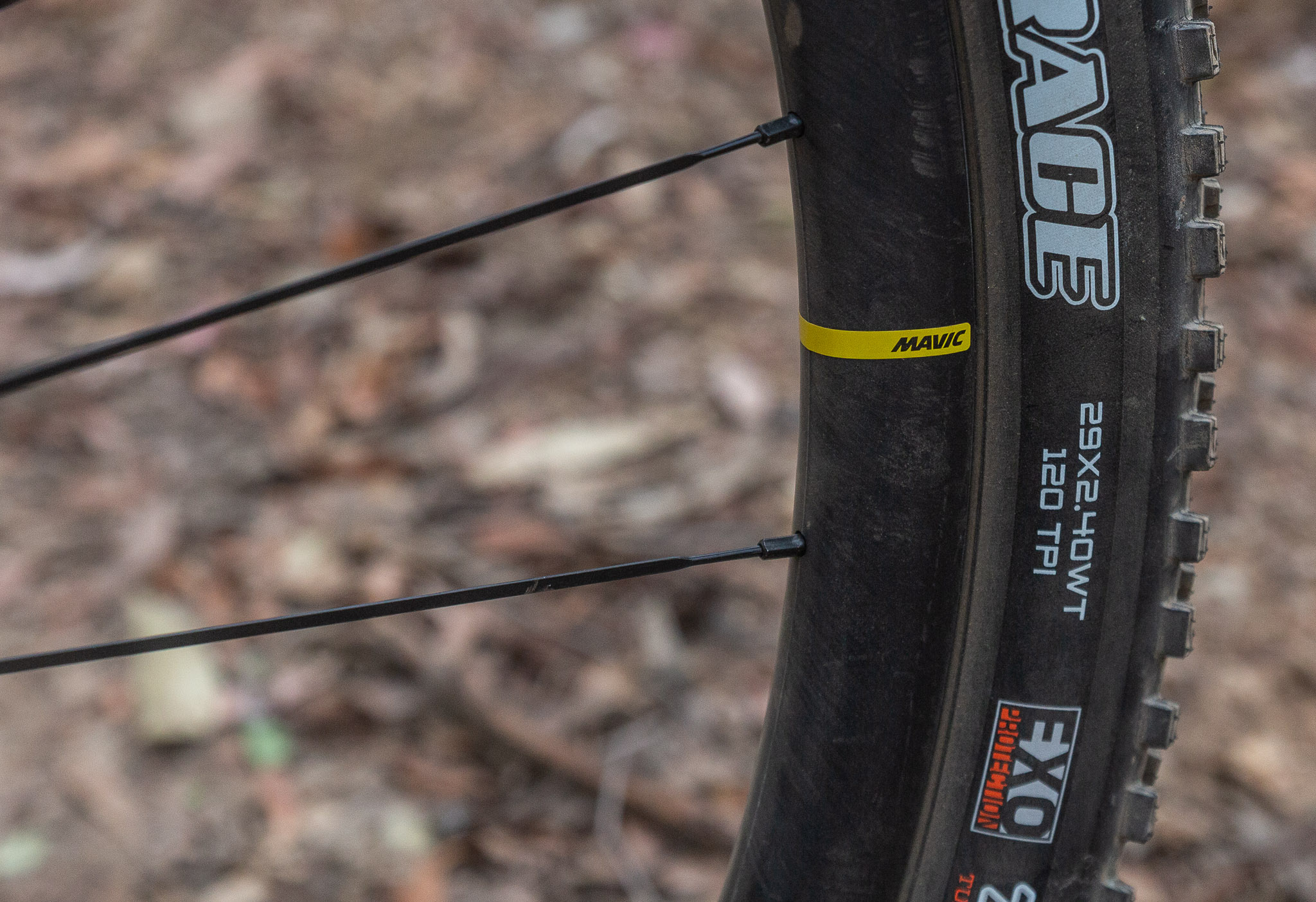
On The Trail
On the first ride it’s immediately apparent that this bike has a racing pedigree. While the downcountry discipline was essentially invented to allow little more forgiveness or scope for someone who enjoys more technical XC riding, this bike is raring to go and dare I say, unforgiving. Weighing in at 11.7kg out of the box without pedals just adds to the sense of urgency the bike offers when riding.
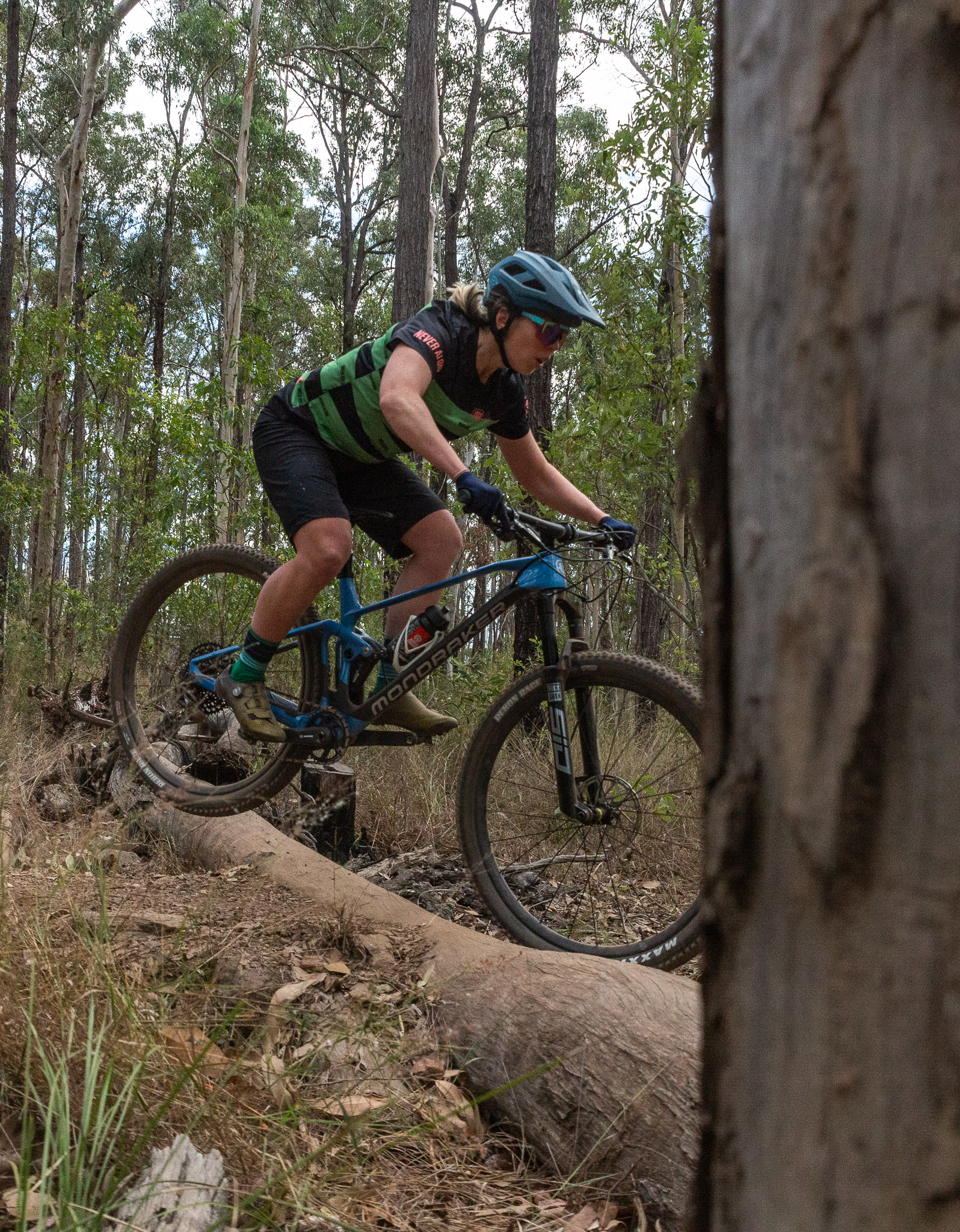
At first I had reservations about the length of the bike and whether it would be a better option to be on a small bike at 168cm. But once I had adjusted the set up for personal preference, I found the short stem and steep seat tube angle position you in the centre of the bike in for optimised climbing. This position also mitigates any front wheel wandering during low speed tech climbing or on very steep terrain; often an issue related to a slacker head tube angle. While out of the box I experienced front wheel wander due to a high front end set up, dropping the front end down several spacers was enough to bring the steering and control into laser like precision.
The only thing that rained on my climbing parade was the 34T chainring. While it was adequate on my local trails, if I was heading out for a hilly marathon style ride or downcountry epic, I felt that most riders would probably benefit from a smaller chainring: a 32T would have given some better scope for savage climbs. Likewise, the 175mm cranks could have been a 170mm and most medium bike riders would have benefitted from the added efficiency and clearance – 170mm are fitted to the small size. I also had a small gripe about the Fizik Antares R7 saddle; I have never met anyone who has willingly specced this saddle on their XC bike, and the convex nature of the saddle was quite uncomfortable… but I say that with the knowledge that saddles are intimately personal, so saddle reviews always need to be taken with a grain of salt.
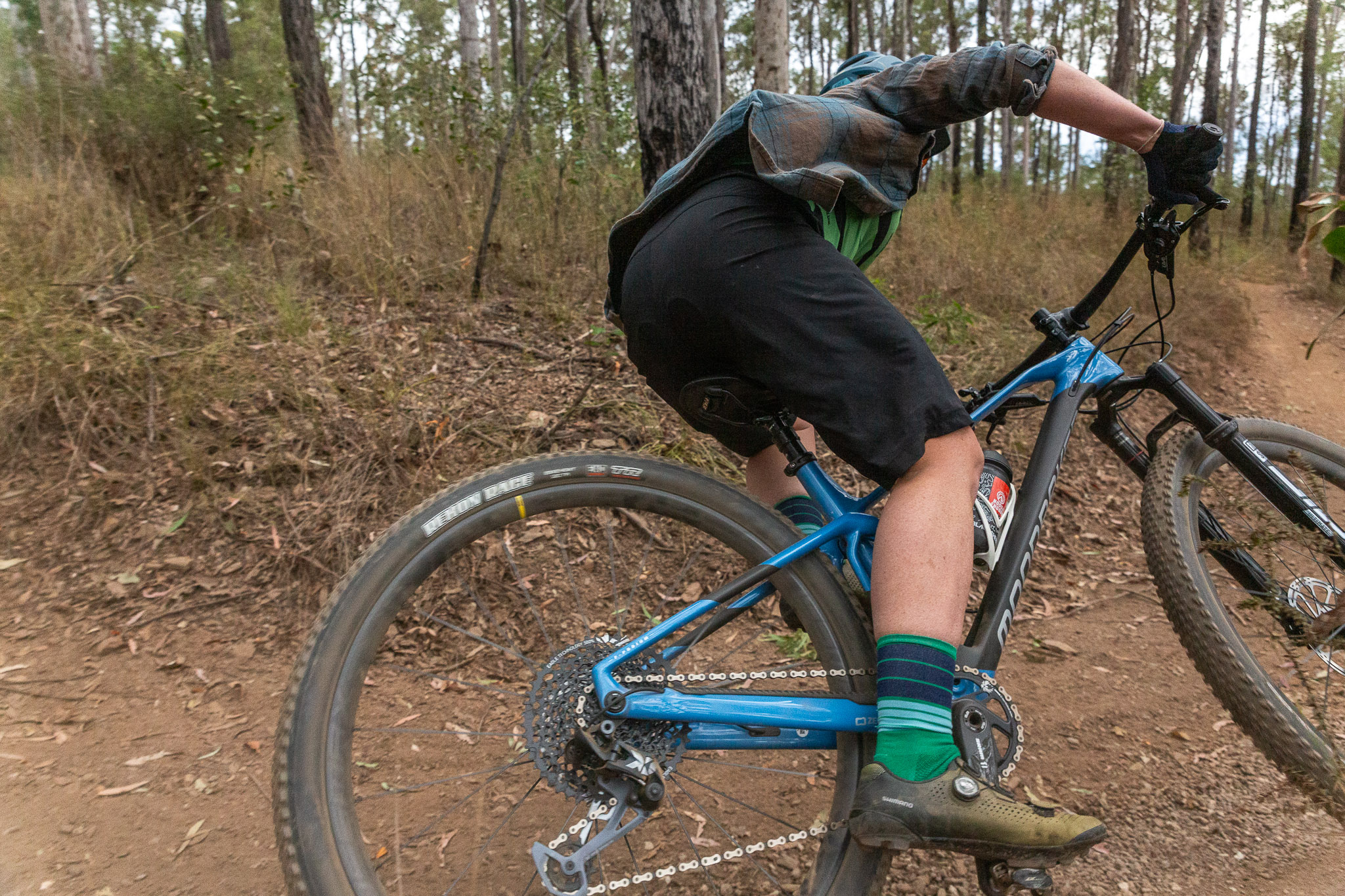
In terms of suspension performance, it may be a big call to say that this is the most stable pedalling platform I have ridden on an XC bike, but I am going to say it. I was able to tackle long gravel climbs, steep tech and undulating road climbs both in and out of the saddle without ever feeling the need to lock out the suspension; its firm pedalling platform would be perfect for all day epics in the hills, to the point where I would argue that perhaps a lockout actually isn’t required. Regardless, lockout action was adequate, and dropper post performance and lever was solid with good ergonomics.
Heading back downhill, I found the suspension to be active but not excessively so; while the suspension was effective you very much knew the limit of your travel. On the descents the bike is far more of a cross country bike with a little bit more travel than a trail bike on a diet. While extremely stable on faster, rougher descents, the bike thrived in the tighter tech with more rider input: the F-Podium DC isn’t quite a point and shoot, and perhaps less on the playful end of bikes when comparing it to North American bikes like the Santa Cruz Blur or Rocky Mountain Element.
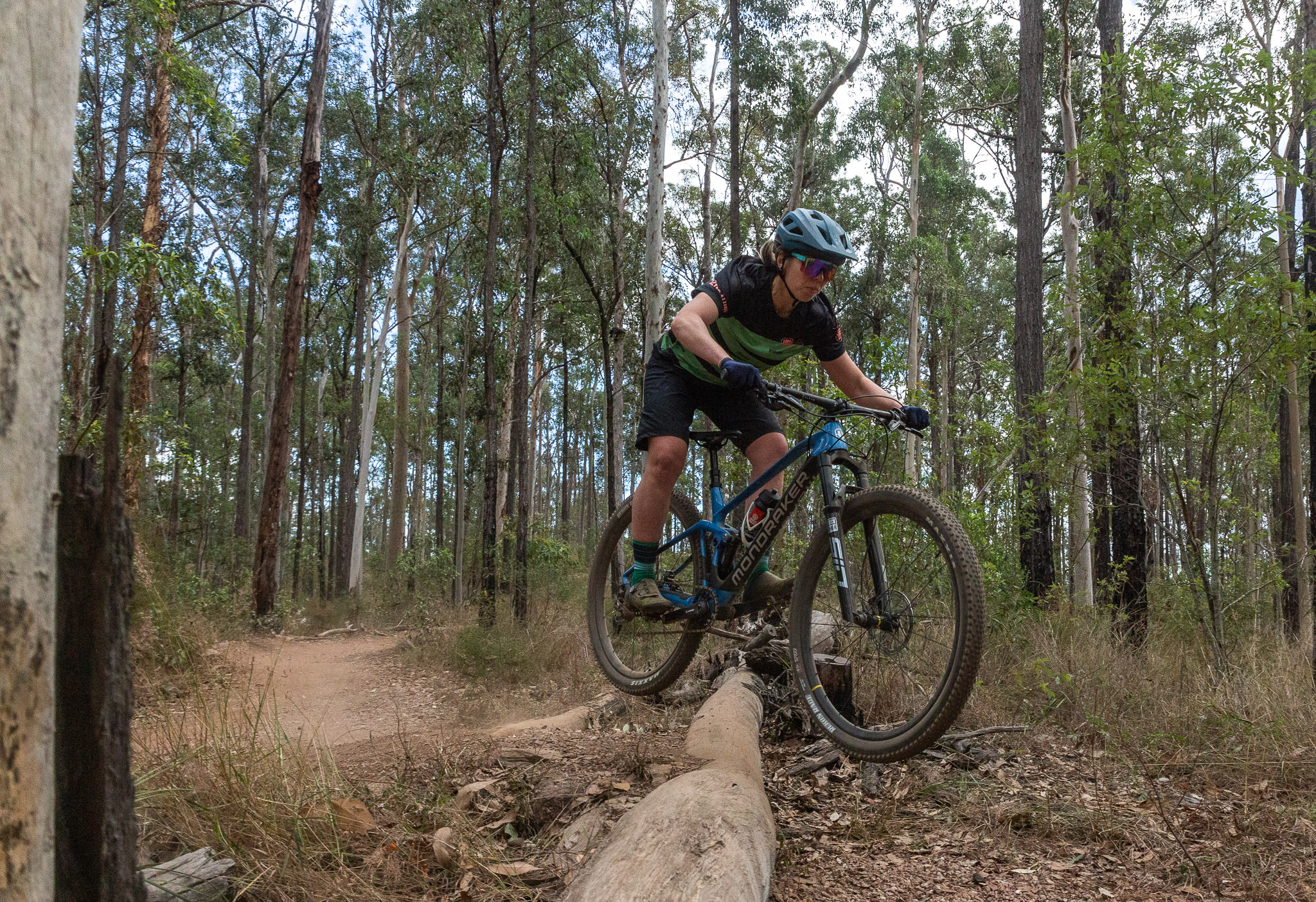
Our Take
The Mondraker F-Podium DC R is perfect option for the XC rider that doesn’t want to compromise on more technical trails, or the trail rider looking for an XC bike. Though it’s touted as a downcountry option, there would be no issues lining up between the tape on this model from local cross country races to nationals, largely due to its exceptionally stable pedalling platform and light weight out of the box. The downside of this efficiency, however, is that the suspension never feels plush; you’re intimately aware you’re on a race bike and for some that may be a deal breaker.
Mondraker's Forward Geometry allowed for point and shoot stability on straighter, rougher trails, however in the tight stuff the bike really benefitted from more energetic rider input. Likewise, the geometry made for a bike that climbed like a mountain goat and was able to thread the needle on technical climbs despite the slacker head tube angle.
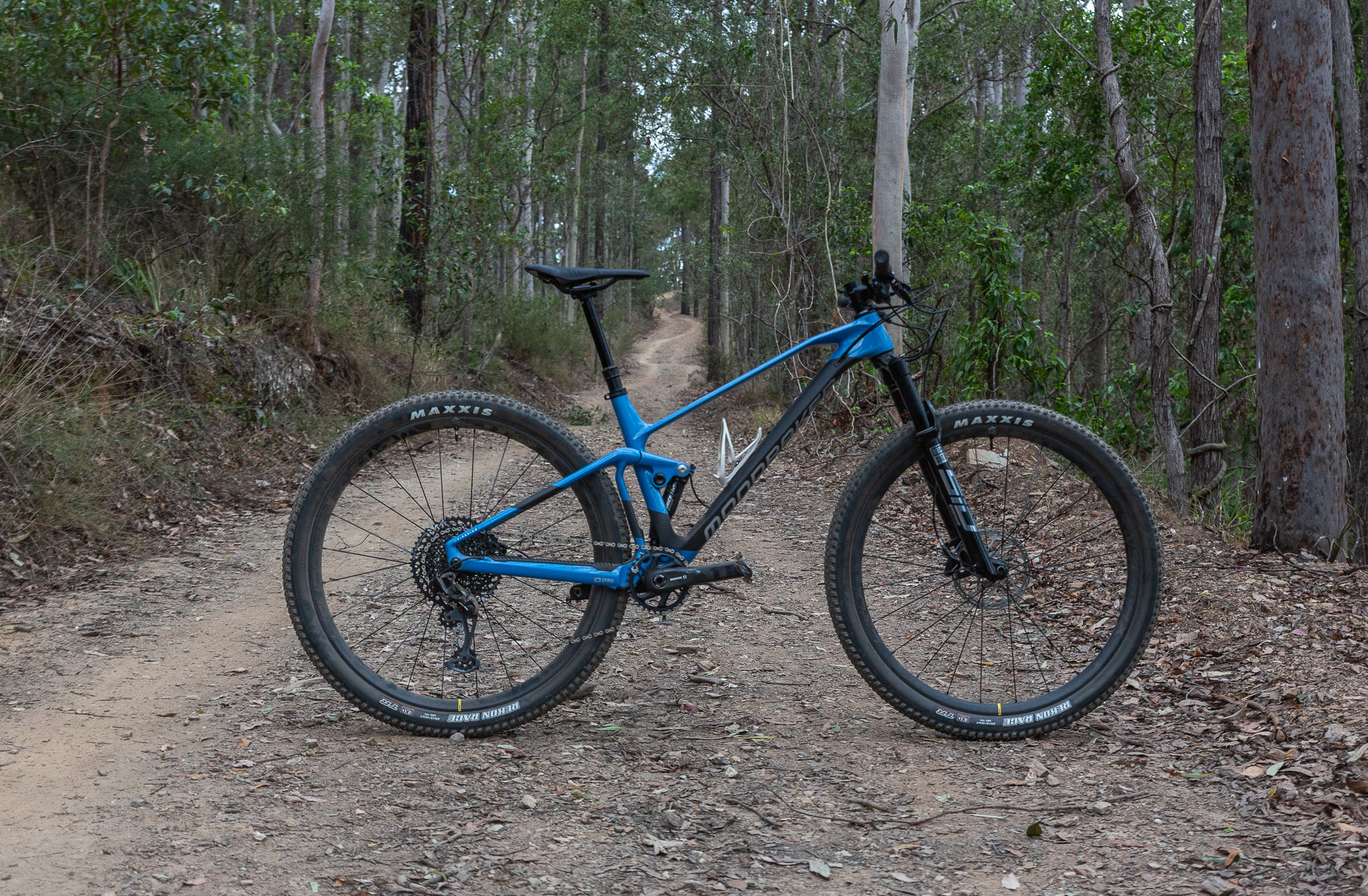
Throughout the testing period, despite the drivetrain being a mix of differing SRAM levels of group set, I found performance to remain crisp and reliable, though the action of the Level TL brakes at times lacked power and their modulation came at the cost of efficiency (at times they felt a little spongy despite adequate set-up). The Mavic wheel set was exceptionally stiff which likely added to the stiffer-than-average feel on descents, and was a quiet achiever on the test. When you add in a set of Maxxis ReKon Race tyres, you have a bike that is ready for business, but also happy to push the limits… within reason.
Overall, the Mondraker F-Podium DC R was a bike I was never sad about taking out for a ride, it really retained the efficiency and snap of an XC bike in a slightly longer travel package. If you’re a diehard XC fan who just wants a little more, but without compromising pedalling efficiency, or a trail rider that wants an all day marathon or XC bike but seeking more than 100mm suspension, the DC model may be for you. It urges the rider to go further and ride more hills and isn’t afraid of a sneaky full-noise descent or two.
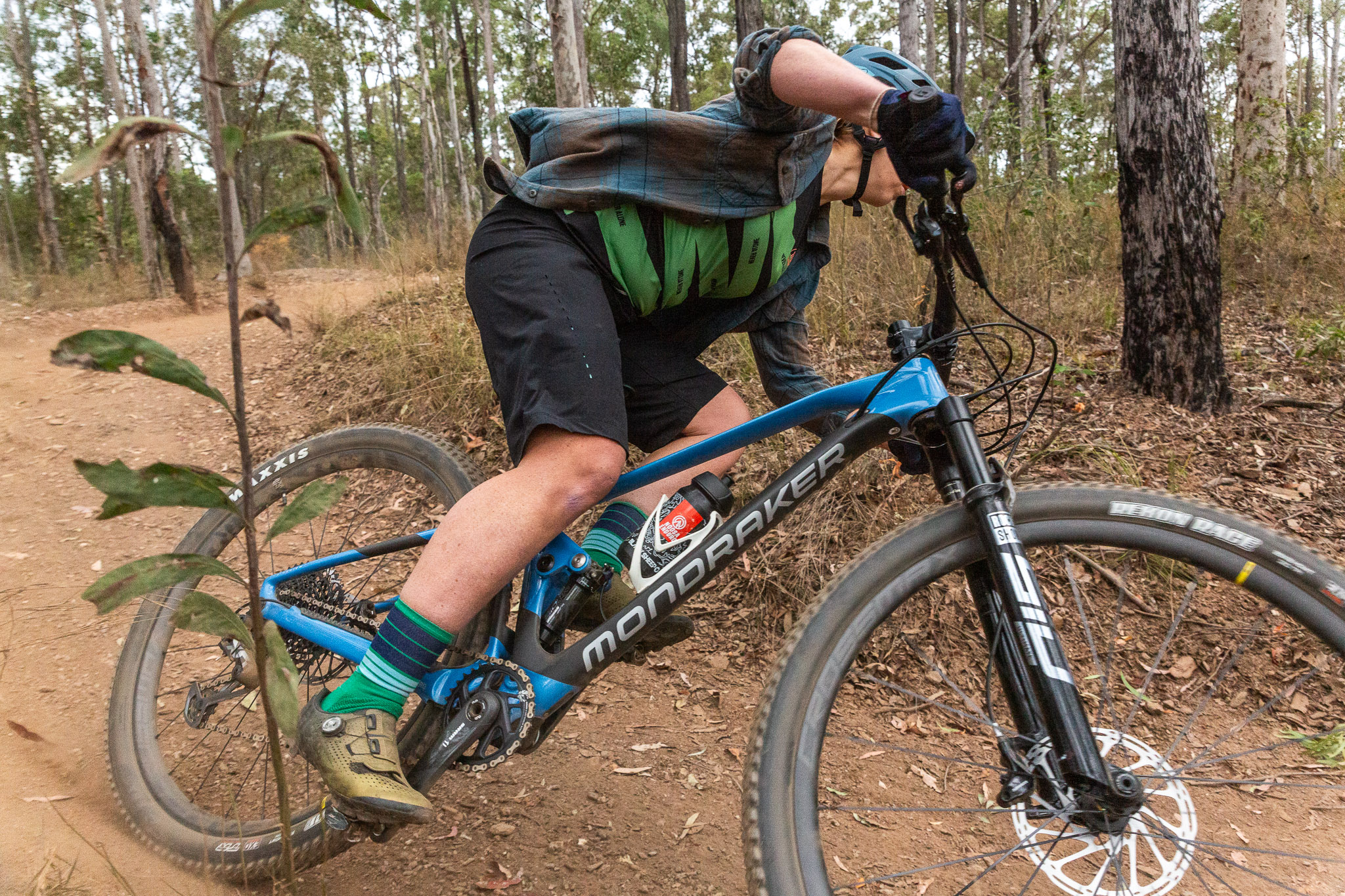
Full specs on the Mondraker F Podium DC R
RRP $10,499
Weight 11.72kg (actual weight, no pedals)
mondraker.com/au/en/
Available Sizes S, M (tested), L, XL
Frame Material F-Podium 29 Stealth Air Full Carbon
Fork RockShox SID Ultimate RL 29, 120mm, 44mm offset
Shock RockShox SID Luxe Ultimate RLR DebonAir, 185x50mm
Shifter SRAM GX Eagle 12sp
Derailleur SRAM X01 Eagle 12sp
Crank SRAM X1 Carbon Eagle, Boost, DUB axle 175mm, 34t
Chain SRAM GX Eagle
Cassette SRAM XG-1275, 10-50T
Bottom Bracket SRAM DUB BSA 73mm
Wheel set Mavic CrossMax Carbon XL R, 30mm internal
Tyres Maxxis Rekon Race EXO TR 29×2.4”
Brakes SRAM Level TL 180/160mm
Stem MDK, 6061 T6 Alloy 50mm
Handlebars ONOFF Sulfur 0.2 low rise 760mm
Seatpost ONOFF Pija dropper post, 150mm
Saddle Fizik Antares R7
